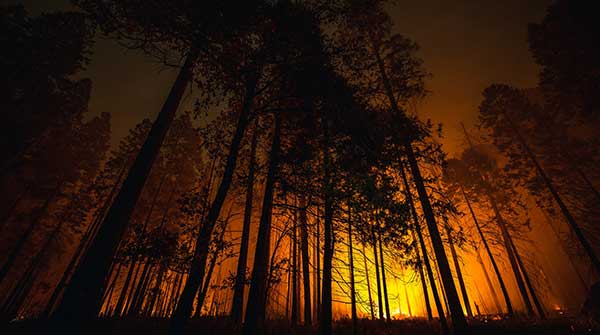From Florence to Canada, compassion for the victims of the wildfires knows no borders
 I’m currently on vacation with my wife and son in Florence, Italy. It’s a magnificent city that’s generally recognized as the birthplace of the Renaissance. We’re occasionally asked by vendors, merchants and passers-by where we come from. When we tell them “Canada,” the response from most people has been something along these lines, “Oh, the wildfires in your country are terrible to watch.”
I’m currently on vacation with my wife and son in Florence, Italy. It’s a magnificent city that’s generally recognized as the birthplace of the Renaissance. We’re occasionally asked by vendors, merchants and passers-by where we come from. When we tell them “Canada,” the response from most people has been something along these lines, “Oh, the wildfires in your country are terrible to watch.”
It’s a big news item in this part of Europe, it seems.
Canada has been dealing with wildfires for the past six months. The largest have been recorded in Alberta, the Northwest Territories, Nova Scotia, Ontario, Quebec – and B.C., which recently declared a state of emergency. Every province and territory has been affected to some extent.
 Photo from Casey Horner |
| Related Stories |
| We need to talk about wildfires and climate change
|
| New tool helps communities defend against wildfires
|
| Don’t blame wildfires on climate change
|
A total of 5,832 wildfires had burned 14,001,313 hectares (or 34,597,998 acres) of Canada’s forest area as of Aug. 20, which is about four percent. Of the 1,041 wildfires still active in the Great White North, 654 were deemed “out of control.”
Wildfires are something that Canada experiences on an annual basis. We’re accustomed to news stories about deadly blazes, displaced communities and difficult situations. Most of us feel terrible about these heart-breaking situations, especially if our families and friends happen to be caught in the middle of one of them.
This year’s fire season has been particularly difficult.
The Canadian Interagency Forest Fire Centre declared the 2023 wildfire season the worst in our country’s history, surpassing the record set in 1989. The smoke emitted from the wildfires, which began in March, affected air quality in Canada and the U.S. – and it spread to Europe by late June.
Naturally, this has led the radical left and environmentalists to demand that governments tackle carbon emissions, introduce new carbon taxes or increase existing ones.
Their positions are complete nonsense.
Carbon emissions will only reduce when the world’s major polluters, including China, India and Russia, change their policies. This won’t happen anytime soon, if ever. For the record, Canada’s share of global emissions as a country/region currently ranks 10th – but is only a meagre 1.5 percent.
As for carbon taxes, they’ve unnecessarily enhanced the role of the state, crippled the economies of several countries (including Canada’s) and wasted taxpayer dollars by the truckload. Several countries have already foolishly implemented a regressive, Pigouvian tax (assessed against private individuals or businesses for engaging in activities that create adverse side effects for society) on the price of carbon, which affects overall market outcomes through social costs rather than private ones. We don’t need more of them, or to find ways to increase the ones we already have.
The Florentines, like most Italians, are unfamiliar with these statistics and discussions. “Italy did not have an explicit carbon tax,” according to a 2021 report by the Organisation for Economic Co-operation and Development (OECD), but “priced about 85 percent of its carbon emissions from energy use and about 38 percent were priced at an ECR above EUR 60 per tonne of CO2.” That’s a bit different than Canada’s federal carbon tax, and the overall impact is less obvious and frustrating for the average Italian taxpayer.
Italy’s main concern is the large number of people and communities affected by the Canadian wildfires. They’ve also had several wildfires (unrelated to ours) to contend with this summer due to the intensely hot temperatures. This included parts of southern Italy, like Cagliari and the Nuoro Provinces, as well as the island of Sardinia. Four people were injured due to these wildfires, according to media reports, with 600 people evacuated and over 12,000 had no water supply in Podasa and Siniscola Municipalities.
Of equal importance, the Italians want to ensure that air pollution levels don’t rise once more. European countries didn’t experience either the “dramatic orange” sky effect or have to “worry about choking on smoke” from the Canadian wildfires, as Politico’s Zia Weise put it on June 27. Smoke did reach Portugal, Spain, France and several northern European nations, but it turned out to be a short-lived nuisance. As NASA pointed out, “most of the smoke that reached Europe was higher in the atmosphere, where it is less likely to affect human health.”
Never let it be said that Canada doesn’t make news internationally unless it involves another embarrassing situation involving Prime Minister Justin Trudeau. One of the world’s great cities is thinking about the safety and well-being of our country right now. It obviously won’t bring an end to the wildfires, but their thoughts and prayers are greatly appreciated.
Michael Taube, a Troy Media syndicated columnist and Washington Times contributor, was a speechwriter for former prime minister Stephen Harper. He holds a master’s degree in comparative politics from the London School of Economics.
For interview requests, click here.
The opinions expressed by our columnists and contributors are theirs alone and do not inherently or expressly reflect the views of our publication.
© Troy Media
Troy Media is an editorial content provider to media outlets and its own hosted community news outlets across Canada.

